Georgia’s Politics, Equality and Environment

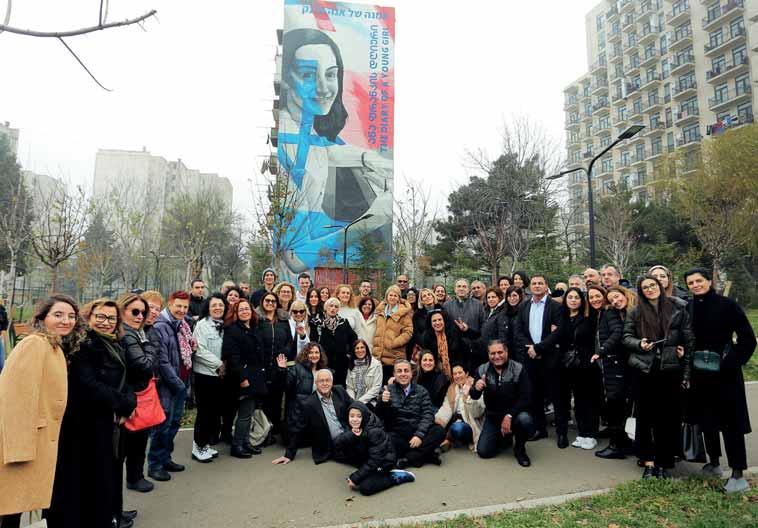 INTERVIEW BY EREKLE POLADISHVILI
INTERVIEW BY EREKLE POLADISHVILI

Peter Fischer arrived in Georgia at the end of August to take up his posting as the new Ambassador of Germany to Georgia. He came to us from the United Arab Emirates.
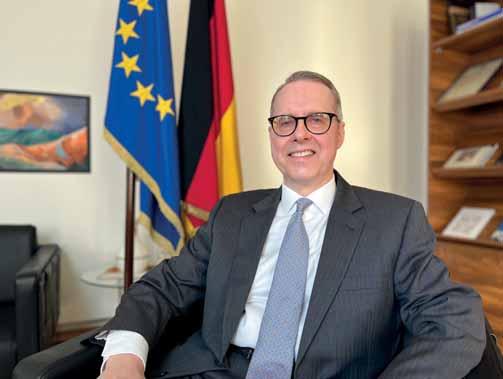
“My past relationship with Georgia was not very substantial because, unfortunately, I had never been here,” he tells GEORGIA TODAY. “My career took me to Singapore, China, the UK, Israel, the USA and then the United Arab Emirates, so you see, I never came close to this region. When I told people I was coming here, everyone gave it glowing reviews. I suppose one connection that I have to Georgia is growing up and going to university in West Berlin. Berlin was divided and we were, like Georgia, facing the Soviet Union, facing Russia, facing that whole system, and in Berlin, we were freedom loving, just like Georgians are.”
We begin our interview by asking the Ambassador for his view of the current Misha Saakashvili situation.
Issue no: 1378 • • DECEMBER 16 - 22, 2022 • • PUBLISHED WEEKLY In this week’s issue... PRICE: GEL 2.50 BUSINESS PAGE 6 POLITICS PAGE 4 The Mediator Profession Actively Developing in Georgia EU, UNDP and OHCHR Assist Georgian DecisionMakers and Civil Society to Create Discussion Forum on Human Rights Youth Internal Migration in Georgia - A Need for YouthCentered Policies World Bank and EU Announce Winners for 2022 Best Annual Report and Transparency Award Crisis in the Lachin Corridor Three Muses. Celebration of the 30th Anniversary of Georgian-German Diplomatic Relations BUSINESS PAGE 8 FOCUS PAGE 4 Building Bridges between Countries and Encouraging Investment in Georgia ON ISRAELI WEEK SOCIETY PAGE 10 SOCIETY PAGE 11 BUSINESS PAGE 6 Continued on page 5 Markets of BONDSPricew/wm/mSTOCKSPricew/wm/m GRAIL 07/2888.05 (YTM 6.62%) +0,3%+14,0% Bank of Georgia (BGEO LN)GBP 26.05 +2,0%+6,8% GEBGG 07/23100.52 (YTM 5.12%) 0,0% 0,1% Georgia Capital (CGEO LN)GBP 7.54 +0,4%+4,6% GEOCAP 03/2494.87 (YTM 10.64%) +0,3%+1,3% TBC Bank Group (TBCG LN)GBP 21.95 1,1% +1,2% SILNET 01/2794.45 (YTM 10.04%) +0,5%+1,8% TBC 06/2498.36 (YTM 6.91%) +0,1%+0,2% CURRENCIESPricew/wm/m GEL / USD2,6736 0,8% 1,3% GEL / EUR2,8177 0,3% +0,5% COMMODITIESPricew/wm/m GEL / GBP3,2809 0,1% +2,3% Crude Oil, Brent (US$/bbl)77,99 5,7% 18,8% GEL / CHF2,8565 0,8% Gold Spot (US$/OZ)1 781,44 +0,7%+0,6% GEL / RUB0,0425 1,4% 4,7% GEL / TRY0,1434 0,7% 1,6% INDICESPricew/wm/m GEL / AZN1,5757 0,7% 1,4% FTSE 1007 445,97 1,6% +1,7% GEL / AMD0,0068 0,9% 1,1% FTSE 25018 819,44 2,6% 4,1% GEL / UAH0,0724 0,8% 1,8% DAX14 306,63 1,0% +0,6% EUR / USD0,9491 0,4% 1,8% DOW JONES34 005,04 +0,2%+0,8% GBP / USD0,8150 0,7% 3,6% NASDAQ11 143,74 0,9% 1,6% CHF USD0,9363 0,7% 0,6% MSCI EM EE30,21 0,3% +1,8% RUB / USD62,8374 +0,5%+3,5% MSCI EM963,58 2,1% +3,0% TRY / USD18,6428 +0,0%+0,3% SP 5003 990,56 0,2% 0,1% AZN / USD1,6968 0,1% +0,0% MSCI FM2 136,67 0,2% +5,5% AMD USD395,0000 +0,2% 0,3%
PreparedforGeorgiaTodayBusinessby
EXCLUSIVE
German Ambassador Peter Fischer on
Ukraine Latest: Drones Shot Down over Kyiv, US and Russia Make Another Prisoner Swap
BY ANA DUMBADZE
Ukraine’s capital Kyiv again woke to blasts and air raid sirens on Wednesday, according to reports from local officials who said the city had been attacked by Iranian-made “Shahed” drones.
Oleksii Kuleba, the head of the Kyiv regional military administration, warned residents that the air alert remained in place and that civilians should take shelter.
It’s unknown what structures the drone attacks were targeting, but Kuleba said “Russia continues the energy terror of the country.”
Ukrainian officials issued an update on the drone attacks, saying the number of Iranian-made “Shahed” drones shot down has risen from 10 to 13.
“Kyiv suffered two waves of attack by enemy drones,” Serhii Popko, head of the Kyiv City Military Administration, said on Telegram Wednesday. Thanks to the effective work of the air defense and EW (electronic warfare) units, 13 enemy drones were destroyed.” He said the unmanned aerial vehicles had hit one administrative building (an earlier report suggested two administrative buildings had been damaged) and four residential buildings had suffered minor damage in the Shevchenkivsky district of the capital.
“People were not injured,” he said.
ZELENSKY: RUSSIA IS DESTROYING CITY AFTER CITY
Ukrainian President Volodymyr Zelensky said Russian forces are destroying “everything in front of them.”
“There is no calm on the front line.
There is nothing easy and simple. Every day and every meter is fought for extremely hard,” Zelensky said in his night address on Telegram.
“Russia is destroying city after city in Donbas - like Mariupol, like Volnovakha, like Bakhmut,” he added.

Zelensky thanked the Ukrainian forces for “repelling another attack by Iranian drones this morning.”
US CITIZEN RELEASED IN LATEST PRISONER EXCHANGE BETWEEN UKRAINE AND RUSSIA
The White House confirmed that a US citizen was released from Russian detention following another prisoner swap between Moscow and Kyiv.
“I can confirm that a US national has been transferred as part of a transfer between prisoners between Russia and Ukraine today,” National Security Council spokesman John Kirby told reporters on a conference call, according to NBC News.
“We certainly welcome that news. But for privacy reasons, I can’t go into any more detail about this individual,” he added.
Earlier in the day, Andriy Yermak, the head of the President’s Office of Ukraine, said on Telegram the exchange consisted of 64 Ukrainian soldiers who were captured in Donetsk and Luhansk, and an American named Suedi Murekezi.
BACKLOG OF 82 SHIPS WAITING TO TRANSPORT CROPS FROM UKRAINE
The organization overseeing the export of Ukrainian crops said that there is a backlog of 82 vessels waiting to be loaded with cargo.
The UN-led Joint Coordination Center also said that 62 loaded vessels are waiting for inspection in Turkish territorial waters.
The Black Sea Grain Initiative, a deal brokered in July among Ukraine, Russia, Turkey, and the United Nations, eased Russia’s naval blockade and saw the reopening of three key Ukrainian ports.
Since the deal was signed, more than 545 ships carrying 13.8 million metric tons of grain and other food products have left for destinations around the world.
Kyiv has previously blamed Moscow
for holding up inspections and delaying vessel movements.
RUSSIA SAYS NO ‘CHRISTMAS CEASEFIRE’
Moscow has said no Christmas ceasefire is on the cards after nearly 10 months of war in Ukraine.
The two sides are not currently engaged in talks to end the conflict, which has killed tens of thousands of people, displaced millions more, and turned cities to rubble since Russia invaded its neighbor on February 24.
Ukrainian President Volodymyr Zelensky said this week Russia should start withdrawing from his country by Christmas as a step to end Europe’s biggest conflict since World War Two. Moscow rejected the proposal outright, saying Ukraine must accept the loss of territory to Russia before any progress can be made.
PEOPLE OF UKRAINE HANDED EU’S TOP HUMAN RIGHTS PRIZE
The people of Ukraine and their representatives were handed the European Union’s top human rights prize Wednesday for their resistance to Russia’s invasion and defiance during the ongoing war.
The 27-nation bloc awarded the “brave people of Ukraine” the prize in October.
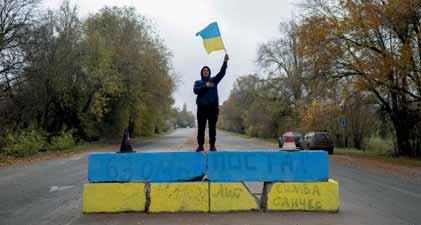
Yulia Pajevska, founder of the medical evacuation unit Angels of Taira, human rights activist Oleksandra Matviichuk and Ivan Fedorov, mayor of the occupied city of Melitopol, were on hand to receive it during a solemn ceremony in Strasbourg, France.
“We have witnessed the inspiring resistance of ordinary citizens making the ultimate sacrifice to delay a column of tanks, senior citizens standing up to face down Russian troops with nothing but
pride as their weapons. Brave women forced to give birth in underground metro stations,” said European Parliament President Roberta Metsola.
“To these people, the message from Europe has been clear. We stand with Ukraine. We will not look away,” she said.
The EU award, named for Soviet dissident Andrei Sakharov, was created in 1988 to honor individuals or groups who defend human rights and fundamental freedoms. Sakharov, a Nobel Peace Prize laureate, died in 1989.
DONORS GATHER IN PARIS TO GET UKRAINE THOUGH WINTER
Dozens of countries and international organizations threw their weight and more than 1 billion dollars in aid pledges behind an urgent new push to keep Ukrainians powered, fed, warmed and moving as winter approaches.
An international donor conference in Paris quickly racked up substantial promises of financial and in-kind support, a defiant response to sustained Russian aerial bombardment of critical infrastructure that has plunged millions of Ukrainian civilians into deepening cold and dark.
More military aid is also on the way. US officials said the Pentagon is poised to approve sending a Patriot missile battery to Ukraine, agreeing to an urgent request from Ukrainian President Volodymyr Zelensky who is desperate for more robust weapons to shoot down incoming Russian weapons.
The approval is likely to come this week, said three officials, who spoke on condition of anonymity because the decision is not final and has not been made public. Providing Patriot surfaceto-air missiles could mark an escalation in the conflict.
GEORGIA TODAY DECEMBER 16 - 22, 2022 2 NEWS






























































































































Lenovo recommends Windows 11 Pro for business PREMIUM BUSINESS ULTRABOOK
We Build Bridges between CountriesIsraeli Week in Georgia
Georgia is hosting ‘Israeli Week.’ The series of events started with the Israeli delegation visiting the ‘Georgian Schindler's Park’ a memorial opened in Tbilisi this year, on the initiative of ‘Israeli House’ and with the support of the City Assembly.
The location has already become a real tourist attraction in the last several months.
Israeli Week is held under the motto "We build bridges between countries".

The organizers of the event are the IsraelGeorgia Chamber of Business and Israeli House. This year the theme of Israeli Week is business, culture, public diplomacy and international activities.
Almost half of the 100 members of the Israeli delegation are women who are interested in business and gender issues in Georgia. Within the Israeli Week, a meeting with Nino Tsilosani, the Chairperson of the Parliament Parliamentary Gender Equality Council, is planned.
The head of the women’s organization from Israel, Heli Friedman, believes that the active involvement of women in business and politics is the harbinger of peace and progress. One of the honorary members of the delegation is Gidi Meir,
the grandson of the legendary Prime Minister, Golda Meir, the "Iron Lady of Israel".
Israeli business groups include large and leading conglomerates, such as the Carasso, Radco, and the head of Bloomb-
erg Israel, who is a woman.
The delegation is headed by David Bitan, head of the Israel-Georgia Friendship Group in the Knesset, the Georgian counterpart of which in the Parliament of Georgia, headed by Givi Mikanadze, supports the broadening of bilateral relations. In Georgia, one of the meetings will be attended by Israeli Ambassador, Hadas Meitzad, and at different meetings, international business organization ICC, and representatives from governmental economic group, will greet the participants.
At a related business forum, The Tsalka Business Forum, successful projects will be presented, the potential of the regions will be introduced, and future projects in Adjara, Tsalka and grandiose plans in Kakheti will be announced. ORBI, a company from Batumi, will represent successful corporation with Israel, and a Wyndham representative will cooperate with Israeli investors on new projects. The participants of the forum will receive the support of the Georgian government for investment projects and overcoming bureaucratic barriers.
The conversation in the field of tourism will concern the successes of 2022, as well as the launch of the Biblical Route,
in 2023, created by Israeli House, in cooperation with the European Association for the Preservation and Promotion of Jewish Culture and Heritage (AEPJ) agreed with the Council of Europe.
The event participants will enjoy Israeli music performed by Georgian and Israeli musicians, among whom will be Mattan Klein.
According to Itsik Moshe, organizer of the Israeli Week and the Chairman of Israeli House and Chamber of Business, it is rare for 100 businessmen to leave the country together. The aim of the visit is to get to know Georgia's potential. Up to 20 personal meetings are already planned, and in 2023 other regions will
receive special attention.
"Relationships are strengthened only through activities, and this is the 25th such business forum. The Israel-Georgia Chamber of Business has become a central bridge of economic relations between Israel and Georgia these past decades," Moshe notes.
Israel Week, business meetings and Georgia's potential will be covered by Israeli media.
As per tradition, Israeli House and the Chamber of Business are holding this event during Hanukkah. This time, too, the first candle of Hanukkah will be lit with the participation of Georgia’s Israeli guests.
Crisis in the Lachin Corridor

sources, have criticized the efficacy of the Russian deployment.
In addressing the concerns of the protesters, referred to as environmentalists by pro-Baku sources, the Azerbaijani foreign ministry insisted that they were exercising their right to protest. “The protests of the members of the civil society of Azerbaijan and environmental activists on the Shusha-Lachin Road is the result of the rightful dissatisfaction of the Azerbaijani public,” they said. While this political war of words continued, bus-loads of additional protestors arrived at the growing roadblock. Azerbaijani and Turkish flags adorned the area, with Russian peacekeepers likewise growing in number.
are only days away from exhausting their resources, potentially endangering patients if things continue. Yerevan, in response, has made it public that they are seeking international assistance, most notably from France and the United States.
BY MICHAEL GODWIN
While Europe plans its winter moves in support of Ukraine against the ongoing war with Russia, another crisis has erupted in the South Caucasus. Old rivals Azerbaijan and Armenia have once again begun accusing each other of provocations, but this new ongoing incident could raise new questions as to the role of Russia in the region. Hesitant to take definitive action, Russian peacekeeping troops and Azerbaijani security forces met in the contested Lachin Corridor.
On December 12, large groups of Azerbaijani civilians gathered at a Russian peacekeeping position along the key road that connects the regional capital of Stepanakert to Armenia proper. While small in number, they carried signs demonstrating that they opposed the reported mining operations carried out by Russianbacked Armenian companies. Pro-Baku sources described these protestors as environmentalist groups, angered by the allegedly illegal mining.
Photos of these protests showed them holding signs in Russian, English, and
More videos surfaced showing the arrival of additional protestors and Azerbaijani security forces. Special response police and Ministry of Internal Affairs troops arrived, even interacting with the Russian troops, albeit with weapons tucked away.
Several members of the protest groups showed the “gray wolves” hand gesture. This hand gesture is particularly offensive to Armenians, as it is perceived as racist and a reminder of genocidal actions from history. Sight of its use led many in Yerevan and other pro-Armenian enclaves to respond harshly to these actions, with many claiming that not only are these violent provocative actions by Azerbaijan, but also that these protests are not what they seem.
Armenian sources claim most, if not all, of these alleged protesters are special services, SOF, or other governmentbacked operatives from Baku. Their mission is to discredit the Russian peacekeeping force, demoralize the Armenian people and military in the region, and ultimately force Russia to withdraw their peacekeeping force from the region altogether. This, as they claim, would allow for further militarization of the area and
potentially offensive operations into Armenia-controlled Artsakh, as well as Armenia proper.
All of this increasingly troublesome tension caused Armenian Prime Minister Nikol Pashinyan to convene an extraordinary meeting of his Security Council. While Baku remained largely silent, the Armenian Foreign Ministry issued a firm statement on the matter.
“This behavior of Azerbaijan not only demonstrates its lack of intention to address the issues of the rights and security of the people of Nagorno-Karabakh and to hold a dialogue with Stepanakert for this purpose, but also once again testifies to the fact that Official Baku continues pursuing the policy of ethnic cleansing towards Nagorno-Karabakh,” they said in an official release.
With these accusations from Yerevan, Baku responded in short time with their own release. Hikmet Hajiyev, Azerbaijani Foreign Policy Advisor to President Ilham Aliyev, said that “The Lachin road is blocked not by Azerbaijani protesters, but by the Russian peacekeeping contingent. Representatives of civil society in Azerbaijan are trying to stop the illegal transportation of looted natural resources, but do not interfere with the movement of other civilian vehicles.”
Both sides, from official and unofficial
Since these statements, an estimated 1,500 people have gathered at the checkpoint. More tents, food deliveries, heating, and quality-of-life equipment has been delivered, reportedly delivered via donations from local pro-Azerbaijan businesses in the area, especially in neighboring Shusha. Meanwhile, massive lines can be seen in Stepanakert (capital of Armenia-backed Artsakh) of civilian cars filling up and saving additional fuel, as Azerbaijan has reportedly cut gas service to the area.

Sources from inside Artsakh have been advised by the government to conserve fuel, limit the use of electricity, and preserve what medical supplies they have. Hospitals have stated online that they
The potential for this to spark another confrontation between the historic enemies is real. Armenia has already alleged that this tactic is a move by Baku to use their special services, disguised as civilians, to lure both Russian peacekeepers and pro-Armenian groups into another war. Azerbaijan, mostly silent on this matter, has backed the protestors and blamed Russia for mishandling the situation. As Russia loses footing in its sphere of influence, this may force the hand of Moscow to take a different path in the South Caucasus.
With the Kremlin’s influence eroding away as its failures in Ukraine grow, Azerbaijan is likely probing the field for weakness. Armenia, having still not transitioned fully from Russian support, is vulnerable, as, despite arms deals with India, growing diplomacy with France and the European Union, and commitments by Yerevan to overhaul the military, this would likely not come in time. Baku may make real on its vague promises to secure Armenia’s southern Syunik (Zanzegur) Corridor and connect with the Nakhchivan Autonomous Republic, without Armenian interference.
GEORGIA TODAY DECEMBER 16 - 22, 2022 4 POLITICS
Azerbaijani, reading “Illegal Excavation is a War Crime,” and “Exploitation of Mineral Deposits=Money Laundering.”
Azerbaijani special police stand guard over both protestors and Russian peacekeepers. Source: Report.AZ
Armenian civilians in Stepanakert line up for gasoline rations. Photo by Armenian Ambassador-at-Large Edmon Marukyan via Twitter
The ChamberIsrael-Georgia of Business has become a central bridge of economic relations between Israel and Georgia
German Ambassador Peter Fischer on Georgia’s Politics, Equality and Environment

“We are observing this case very closely, in fact, an observer from the embassy is attending the trial,” he tells us. “Of course, the reports that Mr Saakashvili is seriously ill are reasons for concern, and our position is that it is the responsibility of the Government of Georgia to make sure that his rights are protected and to ensure the health of all prisoners that are in custody. So, we continue to observe, and we recall the responsibility of every government in the world to give humanitarian and adequate medical care to prisoners.
THE WINDOW THE EU OPENED THIS YEAR WILL REMAIN OPEN FOR A WHILE. AND YET OUR POLITICAL PARTIES ARE STRUGGLING TO FIND A MIDDLE GROUND. WHAT WOULD YOU ADVISE THEM?
It is true that there is a window, and that it is wide open. It’s an immense historic opportunity, and, speaking as a German, I can say that it was the greatest luck and blessing that Germany had after World War II, that the European Union was created and we had the chance to become a member. It is the basis of our peace, stability, and prosperity. This opportunity exists and it's true that the opportunity is now. So, if it is a priority, focus on it and don't be distracted by other issues that might come up. That would be my advice.
WHICH OF THE 12 RECOMMENDATIONS DO YOU SEE AS THE MOST PROBLEMATIC FOR GEORGIA RIGHT NOW?
The independence of the judicial system, depolarization and deoligarchization, because these are the three major conditions for joining the EU. One is to share the goals and values of the European Union. We're a club, we have the same goals and values, we only want members that share our goals and values, and an essential part of those goals and values is to be a sustainable, pluralistic democracy. Pluralistic democracy means that all sectors of the society enjoy rights and can practice their rights and take part in the political life and economic life of the country.

FORMER CHANCELLOR ANGELA MERKEL SAID SHE WOULD NOT APOLOGIZE FOR HER RUSSIAN POLICY. DON'T YOU THINK AN OPEN AND DIRECT REFUSAL TO APOLOGIZE CAN DAMAGE RELATIONS BETWEEN TWO FRIENDLY COUNTRIES, ESPECIALLY WHEN WE KNOW THAT THOUSANDS HAVE PAID THE PRICE WITH THEIR LIVES BECAUSE OF SUCH DIPLOMACY?
Angela Merkel admitted that she made a misjudgment, but what she said was that under the conditions at the time, she acted correctly and according to the best of her judgment, and now she sees no reason to say “I'm sorry” for having done the best she thought she could under the conditions of that time.
In hindsight, it's always easy to recognize your mistakes, and Germany made make one mistake - Our Russian policy was always based on the premise that we have fundamental differences with Russia but that at the same time, we have to reach out a hand and find areas of constructive engagement. In particu-
lar, for our energy relations, we said that buying Russian oil and gas is a stabilizing element: Russia sells, we buy, we have relationship and both sides depend on that relationship in some way.
All our arguments were right about stability creating prosperity, creating economic opportunity, practicing cooperation, despite fundamental concerns, but some people criticized us and warned us. They said: “Your rationality is not the same rationality as Putin's. Putin has other goals, national greatness, controlling the area that he declares as his to control, and he will be willing to throw all that the West has to offer in terms of opportunity away for this dream of national greatness, power, control.” Yet, we always thought a war would be unlikely. That was the mistake.
EVERY YEAR, GEORGIA RECORDS AT LEAST 10 CASES OF FEMICIDE. CAN YOU SHARE THE BEST OF GERMANY'S EXPERIENCE WITH US?
Girls and women have the same rights as men. That should be obvious. Unfortunately, in many parts of the world, there are traditions that discriminate against girls and women. If you don't allow girls and women to reach their full potential, to make their full contribution to society, to the world, we will not reach our full potential as humanity.
The only advice that I can give from the German perspective is that you need to first get into the minds of everyone that girls and women are equal, and that they deserve no other treatment than anyone else. Second, you need good legislation. Acts of violence, murder and even discrimination need to be illegal,
forbidden, and perpetrators of acts of violence against women need to be prosecuted. So, both education and a legal system. And I know that the Georgian parliament is considering new laws as we speak.
SOCIAL MOVEMENT ‘MY CITY KILLS’ TELLS US RUSTAVI WAS POLLUTED FOR 310 DAYS OUT OF 365, AND TBILISI REMAINS ONE OF THE MOST POLLUTED CITIES IN EUROPE. WHAT SHOULD WE EXPECT FROM YOU IN REACTION, AS ONE WHOSE PERSONAL PRIORITY HAS ALWAYS BEEN ENVIRONMENTAL PROTECTION?
Our way of living has become unsustainable. We are using our natural resources faster than they can regenerate. Everyone who has a garden knows you can have damage to the trees, to the plants, but in a year or two, maybe even next spring, they will come back. But we are using
nature and our atmosphere faster than it can renew itself. Once you understand that, you know that it is going to end in a big catastrophe. A crisis is already brewing. You referred to bad air quality. Where that is the case, if I open my windows, I'm breathing poison and it's a catastrophe.
I'm convinced that we all need to work together, and it needs international cooperation. It is a priority for me to work with our Georgian partners and friends on environmental issues. It is already a focal point of our development cooperation. We just signed a development finance contract for intelligent urban mobility in Tbilisi and Batumi for almost 49 million Euros, where the traffic flow will be better planned, we’ll get more public transport, more non-motorized transport, and that will create better air quality and, in general, better living conditions. We’re also focusing on energy efficiency and renewables, and on biodiversity and nature protection.
GEORGIA TODAY DECEMBER 16 - 22, 2022 5 POLITICS
Continued from page 1
The Mediator Profession Actively Developing in Georgia
Mediator's Professional Day Celebrated in Georgia
On December 14, 2019, the "Mediators Association of Georgia" was founded for the first time in the country, and December 14 was declared as the professional day of the mediator. This week the Mediation Week is being celebrated in Georgia for the third time.
GEORGIA TODAY interviewed the Chairman of the Mediators Association of Georgia, Mr. Irakli Kandashvili.
HOW WOULD YOU EVALUATE THE PAST THREE YEARS FOR THE PROFESSION?
Mediation is a new word in Georgian reality, it is a truly unprecedented reform in the last decade, which allows the parties in dispute to resolve the conflict between themselves. The past three years were full of challenges and difficulties for the newly founded association and the profession, although it can be boldly said that the profession and Georgian mediators coped with all the challenges and difficulties with dignity. We were able to take many effective steps in this short period of time, which will become a prerequisite for the further development of the profession. I am glad that all the steps taken during these years were aimed at the development of the profession and its future.
WHAT WOULD YOU HIGHLIGHT IN THE ACTIVITIES?
The introduction of a new profession and its institutional recognition simultaneously require a solid infrastructural
arrangement of the organization, as well as increasing awareness and gaining credibility in society. During these three years, we have taken equally effective steps in the mentioned direction, in particular, Georgian mediators already have a working environment in the form of an office. We were able to develop, with the involvement of foreign experts, European standards for entry into the profession, which on the one hand leads to public confidence in the qualifications of persons in the profession, as well as developed a code of professional ethics and the rules for disciplinary proceedings based on Euro-
pean standards, and agreed on the mandatory annual professional development training courses for mediators, who will be retrained every year and their activities will be based on ethical standards. We introduced an online remote platform for mediation, which was a correct and effective step in the development of the profession in time and space against the background of the global pandemic.
The priority for the association is to increase awareness of mediation in society, and in this direction about 50 memorandums of mutual cooperation have been signed with representatives of various
public and private sectors, with the support of which the process of development and establishment of mediation in Georgia will continue successfully. Among them, it is a priority for us to introduce the teaching of mediation as an alternative dispute mechanism in secondary and higher education institutions, and we can proudly say that from September 2021, mediation has already been introduced in the textbooks of ninth grade students, mediation is taught as a compulsory sub-
ject in three universities, and it has become an optional subject in law faculties of almost all universities. With the support of the United States Agency for International Development, we introduced the very important annual international forum "Mediation for Business" and "Mediation for Lawyers", and therefore every year specialists in this field will have a platform where they can learn about the latest news and practices in the field of mediation. This year, for the first time, the professional oath ceremony of new mediators entering the profession took place on December 14, the professional day.
WHAT CHARACTERIZES MEDIATION AND DISTINGUISHES IT FROM OTHER DISPUTE RESOLUTION MECHANISMS?
Mediation is the only dispute resolution mechanism that allows the parties, considering each other, to be able to and reach a mutually beneficial agreement tailored to each other's interests. With the development of mediation, the culture of reasonable dialogue and social peace is introduced in Georgia.
I will take advantage of your newspaper and once again congratulate each mediator on their professional day and wish them professional success, development, remember that behind us is the good reputation, credibility and collective reputation of the profession and that the professional activity of each of us today is the tomorrow of the mediator profession! Happy New Year 2023 to all of Georgia!
World Bank and EU Announce Winners for 2022
Best Annual Report and Transparency Award
The Best Annual Report and Transparency Award (BARTA) ceremony was held today in Tbilisi, the fourth occasion for celebration of this award since its establishment under the joint World Bank and European Union project Georgia Financial Inclusion and Accountability, which was launched in partnership with the Accounting Reform’s Stakeholders’ Foundation (RSF).
The BARTA 2022 ceremony showcased 16 nominated companies, and was presided over by a distinguished international panel of judges. The selection process was conducted using a robust methodology that emphasized, among other things, the provision of non-financial information which addresses intangible assets, such as brand, customer reputation, know-how and goodwill, which drive corporate value. Judges noted continuous improvement in the quality of reporting over the previous years, as well as the increasing amount of sustainability reporting.
"Congratulations to those companies that are leading the way in providing quality and transparent reporting –including on sustainability," said Catalin Gherman, Acting Head of Cooperation of the European Union Delegation to Georgia. “We are pleased to see the family of best performing companies in Georgia expanding and hope they inspire others to do the same. Under its Economic and Investment Plan and beyond, the EU remains committed to supporting Georgia’s sustainable economic development and to improve the busi-
ness climate for Georgian business, consumers and investors alike.”
“High quality corporate reporting –both in terms of financial and sustainability reporting - is essential to the Georgian economy’s competitiveness, growth, and resilience,” said Sebastian Molineus, World Bank Regional Director for the South Caucasus. “BARTA is playing a vital role in incentivizing and encouraging improved corporate reporting and evolving in line with European and global trends and best practices in financial and sustainability reporting.
Greater transparency will help Georgia become even more attractive to investors, both domestic and foreign.”
First launched in December 2019, BARTA is a part of a concerted effort to address challenges in the quality and transparency of corporate reporting among Georgian companies. Following the enactment of Georgia’s Law on Accounting, Reporting and Auditing in 2016, this annual award is intended to encourage compliance with the new reporting regulations, foster healthy competition between companies, and improve the overall standard of corporate reporting as part of the country’s quest to build up investor trust and confidence both at local and international levels.
Over the coming few years, sustainability reporting in the EU will become mandatory for all large and listed companies. This makes BARTA all the more relevant with this year’s awards: alongside category awards for best non-financial reporting by Large Financial Institutions, Large Non-financial Institutions,
and Small and Medium Companies, the nominations include two awards for sustainability reporting.
The winners in each of the 7 award categories announced this year, are as follows:
• Winner Large Financial Institutions
– JSC TBC Bank
• Honorary Award for Large Financial Institutions – JSC MFO Crystal
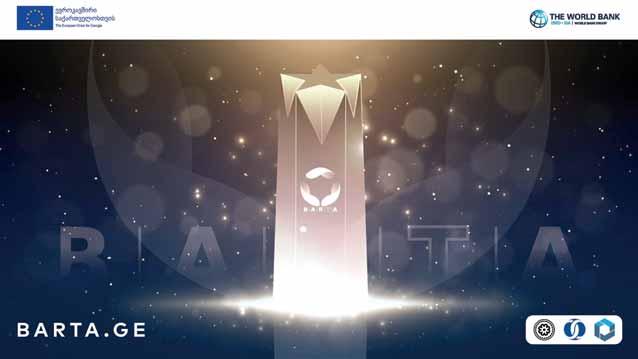
• Winner Large Non-Financial Institutions (with 500 or more staff) – JSC
Georgian Railway
• Winner Small and Medium Compa-
nies (with less than 500 staff) – JSC TBC Leasing
• Honorary Award for Small and Medium Companies (with less than 500 staff) –MFO MBC Capital
• Winner Best Sustainability Report
– JSC Bank of Georgia
• Honorary Award for Sustainability Report – JSC Lisi Lake Development
"BARTA is becoming more and more popular each year, and there is a growing interest from the companies to participate in the competition and win this honorable award,” said Giorgi Tabuash-
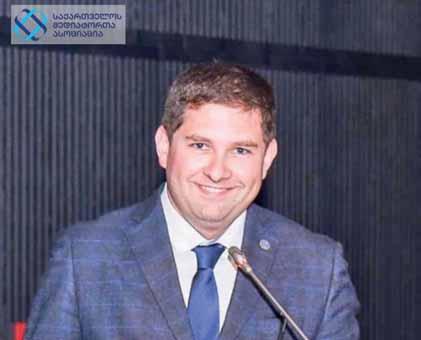
vili, Chairman of the Board of RSF. “All this contributes to the introduction and establishment of widespread corporate governance and appropriate reporting in accordance with international standards and best practices, which in turn will have a positive impact on Georgia’s investment environment.”
This year the BARTA competition was open to all public interest entities (PIEs), which includes all A and B listing companies, admitted to trading companies, banks, insurance companies, among others.
GEORGIA TODAY DECEMBER 16 - 22, 2022 6 BUSINESS
Mediation is the only resolutiondispute mechanism that allows parties to be able to reach a benemutually ficial agreement tailored to each other's interests
K LEin & i skandaryan
LEin & p antsulaia This is a unique law firm on the Georgian law firm market as it joins forces between a Western law firm and a Georgian law firm. In parallel, also in October, Klein Law Group Armenia joined its practice with that of Former Armenian Judge
creating the new Armenian law firm THE KLEIN LAW GROUP IS PROUD TO ANNOUNCE The merging of the practices of the Klein Law Group Georgia and Pantsulaia Associates creating the new Georgian law firm Practices Customs & Product Certifications Real Estate Services Venture Capital/Private Equity & M&A Trademarks & Franchising Intellectual Property Evaluations & Due Diligences Patent Licensing & Exploitation Strategy Patent Prosecution & Strategy Litigation & Arbitration Employment & Immigration Tax Corporate Klein & Iskandaryan 1 Yekmalyan Street Yerevan 0002, Armenia +37491193116 info@KleinLawGroupARMENIA.com www.KleinLawGroupARMENIA.com Klein & Pantsulaia 3 Akaki Khorava St Tbilisi 0176, Georgia Tel +995597026856 info@KleinLawGroupGEORGIA.com www.KleinLawGroupGEORGIA.com
K
Sima Iskandaryan
Youth Internal Migration in GeorgiaA Need for Youth-Centered Policies
BY ANA DUMBADZE
Nowadays, migration is considered as a global phenomenon, the reason for which is, in most cases, to gain access to quality education, pursuit of better careers and wages, and, generally, the desire to live a quality life. Since Georgia gained independence, internal migration has increased as a result of labor migration, seeing citizens relocating from villages to cities. The desire to improve social and economic conditions forced a significant section of the population to abandon their places of birth and either move to the city, or leave the country altogether. Among the plethora of other reasons, a lack of available high-paying jobs and a sense of instability forced the Georgian population to leave their country/place of residence.
There are two types of migrationinternal and external (international). Unlike external migrants, internal migrants move to a new place but remain in their country of origin; for instance, village populations move to urban areas. The latter is a very acute challenge for Georgia nowadays – for a small country like it, the irreversible process of emptying the regions, especially when it comes to the young generations leaving their homes for a long time, and sometimes forever, is a big problem. This process significantly damages Georgia’s socioeconomic environment, the population of Georgia’s capital increase at the expense of depopulation of the regions. In the majority of cases, it is youth that chooses to leave their homes in villages and move to regional centers. The problem is especially noticeable in the mountainous villages, where you can see numerous abandoned, empty houses with locked doors and only a few elderly residents remaining.
To look into the problem more thoroughly, and find reasons and possible solutions, on December 12, a presentation on the findings of the study “Youth Internal Migration in Georgia through the Lens of Civic and Political Activism” took place in Tbilisi. The research findings were presented to the public by its authors Nino Jibuti, EaP Civil Society Fellowship Programme Fellow, and Gvantsa Ichkiti, Research Assistant, EaP Civil Society Fellowship Programme. The report attempts to explore the civic and political activism of young people aged 18-35 in five target regions: Imereti, Samegrelo-Zemo Svaneti, the Autonomous Republic of Adjara, and
Shida and Kvemo Kartli and the perspectives of regional cross-sectoral cooperation. In addition, the study is an attempt to analyze the root causes that urge young people to leave the regions and offers possible solutions to reduce internal migration.


"The youth internal migration is a complex issue that involves multisectoral engagement and cooperation. There are a plethora of reasons that play a role in the depopulation of the regions. Young people are the segment of society that through a bottom-up approach should take part in the development of their regions at the local level. However, the reality is the opposite - they are forced to leave the region due to the lack of resources, and access to quality education," noted Nino Jibuti, one of the authors of the research.
The audience was also addressed by Mariam Khuroshvili, Regional Liaison for the EaP Fellowship Programme (Armenia, Azerbaijan, and Georgia).
“Young people are the main driving force of our society. However, we have very little information on the problems and challenges they face. This research is of fundamental importance because it shows the voice, vision and priorities of young people living at the local level. 2022 is the European Union’s Year of Youth support (European Year of Youth) and in this direction, many projects have been implemented in Eastern Partnership countries, including in Georgia. However, we can never take care of young people without taking into account their involvement and priorities. That's why we need to outline their role and offer effective platforms for participation. I hope that the local governments and civil and private sector representatives in all five target regions will take into account the recommendations given in the framework of the research and offer a wider arena of development to the young people living in their municipality,” Khuroshvili said.
The report reads that “According to estimates published by The National Statistics Office of Georgia (GeoStat), it can be assumed that the highest rate of unemployment is among the age group 15-19, followed by the 20-24 age group and 25-29-year-olds. The young people who should be generating wealth and gaining work experience at a local level are forced to leave their communities and move to urban areas due to the lack of job opportunities.
“Georgia’s geopolitical location, plus its socioeconomic and political situation, are considered the root causes for involuntary internal migration. Therefore, it
is crucially important for a country such as Georgia to prioritize and plan and implement internal and external migration policies rationally,” reads the document.
At the end of the presentation, a Q&A session was held which allowed attendees to get involved in the discussion and express their opinions on the issue.
The research concludes that one way to keep youth in the regions and, indeed, in the country is to have an appropriate and time-relevant urban policy that encourages civic and political youth activism at a local level.
The main findings of the research reads that among challenges facing youth are - too little use of the principle of bottomup management and participation by local authorities in the regions; infrastructure problems and limited mobility; local government priorities are not aligned with the needs of young people; Lack of basic needs in highland regions and, accordingly, limited access to resources; lack of potential for professional development locally; lack of access to quality education locally.
In terms of civic and political activism among youth, it is noteworthy that: young people do not have the feeling that their involvement will produce real results; young people are more skeptical of political activism and associate it with unwanted labels; the majority of participating youth have been involved in some form of activism at least once; in the regions, voicing a critical opinion out loud is perceived as confrontation on a personal level.
Regarding inter-sectoral cooperation, the study notes that local governments of some regions are particularly active in planning various youth events; some regions successfully involve civil society organizations in consultation meetings; personal contacts largely determine the perspective of cooperation between representatives of different sectors; effective cooperation between sectors is hampered by frequent staff turnover in the public sector; while having a critical position towards local authorities significantly reduces chances of cooperation. Moreover, in some cases, public and non-governmental sectors perceive themselves as competitors.
According to the research, the main causes of internal migration of youth are: lack/absence of youth spaces in the regions; low level of education and lack of non-formal education opportunities; initiatives of international donors do not match the real needs of the population. Against this background, the balance of return migration in Zemo Svaneti is positive, which is probably linked to the
tourism development in the region.
The report also draws relevant recommendations for different sectors to address the above-mentioned issues.
Recommendations for local governments include promoting the involvement of young people in the decisionmaking process by developing appropriate mechanisms; increasing access to information for young people using appropriate communication channels and vocabulary; arrangement/development of municipal roads and transport; weakening of favoritism - cooperation with different organizations; enhancing cooperation between municipalities of one region by implementing common initiatives; Production of internal migration statistics by age.
For civil society organizations, the authors of the study suggest planning and implementation of sustainable results-oriented events for young people; development of programs which are based on the research of real needs and whose initiators are undoubtedly young people; implementation of programs focused on NEET youth; enhancing cooperation between non-governmental organizations operating in the region.
For the private sector, the following
are suggested: in collaboration with various sectors, developing paid internship programs and promoting employment; promotion of young local entrepreneurs; offering decent working conditions and pay to qualified youth; creating a scholarship fund for students with good academic performance in the region, encouraging admission to local universities.
For donors, the research recommends conducting in-depth needs research at the local level and propose a grant project accordingly; as well as conducting result-oriented activities and quality control; instead of organizations sent from the regional center, strengthening local non-governmental organizations and providing them with financial resources.
The report will help local governments receive constructive feedback, be more accountable, and plan and implement more youth-centered programs.
The Project is funded by the European Union within its Eastern Partnership Civil Society Fellowship Programme 2021.
The report, both in Georgian and English, is available online at the website of the Georgian Institute of Politics (GIP).

GEORGIA TODAY DECEMBER 16 - 22, 2022 8 BUSINESS

Indulge Me - I Have More
the funeral, just went ahead and shot; and it seems people (especially those who couldn’t make the trip down from Svaneti) were glad when I posted them on social media.
I have to get back in touch with my emotions. I have not yet shed any tears, though plenty of Georgian men did. It was all so sudden, and we were in shock at his passing at age 65, but I still have this knot inside me which must work loose. I wait for that logjam to come unstuck, unable and also unwilling to drum up feelings which might be forced instead of letting the natural grief come out when it’s ready. At least I’m in a culture where a man bursting into tears can get away with it, if that happens.
I still battle the guilt of not trying harder to get allowed into Intensive Care for one last visit with my dear friend. A few seconds’ video of him taken the day before he died shows him conscious, eyes open, waving at the camera. Less than 24 hours later he was gone. My own last photo of him alive is about 7 years old. I have over 160 pictures of him, from 2000 until 2015 or so. They’re not nearly enough, now. Just scraps and snapshots from a rich time together.
We had so many good times that I hardly know where to begin, learning each other’s culture and personality until we were comfortable with each other in either silence or speech. Laughter and tears, arguments and discussions and reconciliations, and the ceremony of becoming blood brothers at his parents’ grave, which delighted him when I initiated it after some innocent inquiries as to the necessary ritual. There’s enough to fill a book: don’t put it past me!
BY TONY HANMER
The funeral was here, thank God, actual location decided after some fairly late backand-forths. Sure, he had many, many friends and relatives up there in Svaneti; half or more of his village of Etseri would have turned
out for it. But so few of us would have gone from here, in contrast: it’s an 8 hour journey minimum, and it’s cold there now, and where on earth could you have the funeral feast for 350 or more people which we had here? The single place I know of is the largest hotel in Mestia: drive us all from Etseri the 30 km there and same back, back being trickier as many people would be drunk. Hopefully no drivers would, but you never know,
as bitter, deadly experience has shown me.
Plus, his wife and two adult children live here in Tbilisi; visiting the grave is a super-important thing in Georgia (we did it today as I write this, for the 9th day after death), and how often could or would they make the arduous journey? There’s the ormotsi (40 days after death feast) and the year after death, plus Easter, and more.
They moved the body from his apartment to a large Orthodox church nearby for the day of the funeral, and just as well. The courtyard and interior of the church were filled with hundreds of people filing through who all would have missed a final look and farewell otherwise. Then we convoyed away to the cemetery, then to the feast.
I decided not to ask about taking photos and video of the graveside part of
Tony Hanmer has lived in Georgia since 1999, in Svaneti since 2007, and been a weekly writer and photographer for GT since early 2011. He runs the “Svaneti Renaissance” Facebook group, now with nearly 2000 members, at www.facebook.com/ groups/SvanetiRenaissance/ He and his wife also run their own guest house in Etseri:

www.facebook.com/hanmer.house.svaneti
EU, UNDP and OHCHR Assist Georgian Decision-Makers and Civil Society to Create Discussion Forum on Human Rights

As Georgia gets ready to adopt its National Human Rights Strategy for 20232030, the European Union, the United Nations Development Program (UNDP) and the UN High Commissioner for Human Rights (OHCHR) are creating a space for discussion on ongoing reforms on administrative offences regulatory framework and the effective realization of economic, social and cultural rights, bringing together decision-makers, civil society, and human rights defenders.
The conference “Stand up for Dignity, Freedom and Justice for All” this week echoed the Human Rights Day theme and called on the government, parliament, civil society organizations and communities to work together and seek solutions to the challenges that prevent Georgia’s citizens, especially representatives of vulnerable communities and minority groups, from fully enjoying their constitutionally guaranteed rights.
Mikheil Sarjveladze, Chairperson of the Parliamentary Committee for Human Rights and Civil Integration; and Niko Tatulashvili, Advisor to the Prime Minister of Georgia on Human Rights Issues, opened the conference.
Catalin Gherman, Acting Head of Cooperation of the Delegation of the European Union to Georgia; Nick Beresford, UNDP Resident Representative in Georgia, and Vladimir Shkolnikov, Senior Human Rights Advisor for the OHCHR’s South Caucasus Office, addressed the partici-
pants with welcome remarks.
“The EU supports a constructive discussion on human rights between decision-makers and civil society. The new National Human Rights Strategy and the follow-up Action Plan should encompass the rights of all social groups, including the vulnerable and marginalized communities, and come up with solutions
to address the challenges linked to discrimination and exclusion in Georgia,” said Catalin Gherman, Acting Head of Cooperation at the Delegation of the European Union to Georgia.
“We bring economic, social and cultural rights to the center of the discussion on human rights challenges faced by minority groups, especially the most vulner-
able, such as the national and religious minorities and the LGBTQI+ community. The conference will help produce policy reforms and practical measures to support Georgia’s progress toward an equal, just and fair society,” said Nick Beresford, UNDP Resident Representative in Georgia.
“Whenever and wherever humanity's
values are abandoned, we all are at greater risk. The solutions to today’s greatest crises are rooted in human rights. Thus, it is a primary obligation of officials in all states, including Georgian authorities, to respect the rights and dignity of all individuals regardless of their race, color, ethnicity, religion, sexual orientation, gender, disability, age or other grounds. Stigmas and deep-rooted stereotypes should not have room in contemporary Georgia,“ said Vladimir Shkolnikov, Senior Human Rights Advisor for the OHCHR’s South Caucasus Office.
The conference was part of the Human Rights Week which kickstarted a yearlong campaign acknowledging and promoting the 75th anniversary of the Universal Declaration of Human Rights. The campaign has reached out to wide circles of Georgia’s society, bringing together an array of partners and supporters, including the government, parliament, civil society, the private sector, community organizations, international agencies and diplomatic missions.
“Human Rights for All” is a $3 million EU-funded initiative supporting Georgia to promote respect for human rights, strengthen human rights protection in all areas of life, and address the remaining issues of concern. The initiative is implemented by the two UN agencies – UNDP and OHCHR, in close collaboration with national partners and stakeholders.
GEORGIA TODAY DECEMBER 16 - 22, 2022 10 SOCIETY
Photo by Vladimir Valishvili/UNDP
* * *
Three Muses. Celebration of the 30th Anniversary of Georgian-German Diplomatic Relations
the lives and experiences of these three outstanding women artists as they conversed and remembered it: the early years they spent in different German cities and in Berlin from the early 90s upto now, the various stages of their artistic careers which are stories of human effort and endeavour with disappointments, obstacles, hopes and success. For those who experienced Tbilisi in the 90s during the unprecedented economic crisis, resulting in electricity cuts, blackouts and collapse of heating systems with ravaging effects on cultural and social lives the excerpts from Nino Haratischwili's novel "The Lack of Light" that she selected for reading on this festive occasion brought mixed memories of nostalgia and déjà-vu.
Nino Haratischwili, born 1983 in Tbilisi/Georgia, is an award-winning theatre writer, director and novelist. Her great family epic "The Eighth Life (For Brilka)", translated into 25 languages, became a worldwide bestseller; a major international film adaptation is in preparation. Her work has won many awards, including the Anna Seghers Literature Prize, the Bertolt Brecht Prize and the Schiller Memorial Prize. Her novels "The Cat" and "The General" were shortlisted for the German Book Prize 2019. Her new novel "The Lack of Light" has already been sold in 15 countries before its publication.
Hippocratic or Hypocritical Oath
 OP-ED BY NUGZAR B. RUHADZE
OP-ED BY NUGZAR B. RUHADZE
To write this extraordinary, although not terribly indispensable piece, I had to take deliberate pains to go through some copious readings into the readily available literature, both antiquated and modern, and I did this only because I wanted to have a fair and calculated insight into Georgia’s third president’s recent medical story. Yes, I mean the story, not the anamnesis, which would have taken me too far, likely straight into some ugly blunders. Nothing is clear to us regular folks in the current Misha Saakashvili case: half of them say the guy is at the brink of inevitable demise, the other half is acting like a doubting Thomas. Take me for instance- I have no clue where the truth is, yet I am a journalist with more than half a century of experience under my belt, and a certain amount of affordable straightforwardness.
This situation is a blind alley, and in the stalemate, discomfort overwhelms us. Misha is surrounded by hundreds of medical personnel, who have produced thousands of pages of medical conclusions (“diagnoses”), and that only happening because the ex-chief executive is doing his time not in a penitentiary but within the comfy chambers of a state-of-the art Tbilisi clinic.
Before I started penning this piece, I had a look at the Hippocratic Oath, and here is what I got out of this universally known and used medical text on medicinal ethics, taken by physicians to uphold certain explicit standards, an antique text, still perfectly functional in significance even today, that emphasizes informational confidentiality and doctoral non-malfeasance as inevitable obligations to function as one: Jurisdictions all over the world provide for observing the Oath.
never divulge, holding such things to be holy secrets.” This is paramount indeed, and I wonder if a slight has permeated some of the segments of our medical world in this particular regard. On the other hand, we cannot be sure that all doctors have taken the famous Hippocratic Oath, or that the Oath would prevent the concerns that physicians might be involved in certain political games.
The impasse in Misha’s much-talkedabout case, the solving of which has the serious potential to preempt the outcome of his just as sensational court case, sees the intermingling of medical and political processes and the likely drastic obstruction of the entire process.
In the modern world, the medical associations and colleges put into practice the wordy professional documents on ethics, some updated here and there, with the redacted texts preserving the spirit of the Hippocratic Oath. One update is that administering poisonous drugs to a patient is considered immoral by our modern-time doctors, especially if the outcome happens to be lethal. Here goes the further quote from the Oath: “Practice two things in your dealings with disease: either help or do not harm the patient, because good practice is defined as effective practice.” If our doctors know exactly what they are preaching and practicing, they should not be ashamed to say “I know not,” as the text of the oath suggests, nor should they fail to call in colleagues when the invitee’s skills are needed for a patient's recovery, fully respecting the privacy of a patient so that their problems are not disclosed that the world may know; “most especially must the doctors tread with care in matters of life and death, preventing disease whenever he or she can, for prevention is preferable to cure.”
BY DR. PHIL. LILY FÜRSTENOWKHOSITASHVILI
To mark the 30th anniversary of the resumption of Georgian-German diplomatic relations, the Federal Foreign Office, in cooperation with the 13 Horizons Culture Program, organized an elegant soirée at the Berlin Concert Hall, inviting exceptionally talented Georgian women artists: musicians Dudana Mazmanishvili and Lisa Batiashvili, together with writer Nino Haratischwili. Germany's role during these three decades has been of great importance for the formation of Georgian civil society and cultural as well as scientific exchange. Numerous scientists, authors, artists, sportsmen, politicians, diplomats and thinkers, after studying in Germany, have contributed to the country's development and laid important milestones in Georgian-German relations.

In this context, three artists who live and work both in Germany and in Geor-
gia presented a diverse program. Nino Haratischwili read from her novel "The Lack of Light", which traced the friendship of four women against the backdrop of Georgia's recent history. Lisa Batiashvili on the violin and Dudana Mazmanishvili on the piano enchanted their audience with a repertoire ranging from Georgian compositions to classics by Bach and Brahms to film music. Apart from the amazing performances by Dudana Mazmanishvili and Lisa Batiashvili this, one of the main highlights of the evening was the conversation between these three outstanding women artists about the years they spent in Germany and how this period of time transformed their lives. As the writer Nino Haratischwili put it, there is no such thing as a strong women because this would mean that there are lots of weak women, which would be untrue, especially referring to Georgian women who endured wars, political instability and severe economic and social crisis throughout the last 30 years after the fall of the Berlin Wall and the end of the Soviet era. The audiences had this unique opportunity to follow
PUBLISHER & GM
George Sharashidze
COMMERCIAL DEPARTMENT
Commercial Director: Iva Merabishvili Marketing Manager: Natalia Chikvaidze
EDITORIAL DEPARTMENT: Editor-In-Chief: Katie Ruth Davies
The award-winning Georgian-German violinist Lisa Batiashvili has performed with some of the world's finest orchestras, conductors and soloists. Batiashvili is the artistic director of the Audi Summer Concerts in Ingolstadt. For the 2020 festival, she designed a program to celebrate the festival's 30th anniversary as well as the 2020 Beethoven Year, themed 'Lights of Europe.' She regularly appears on stage with orchestras such as the Berlin Philharmonic, the Vienna Philharmonic, the Royal Concert Orchestra and the Boston Symphony Orchestra. As an exclusive artist of the Deutsche Grammophon, Lisa Batiashvili released the album "City Lights" in June 2020. Dudana Mazmanishvili, born in Tbilisi, received her first piano lessons from her mother at the age of three. Her extraordinary virtuosity, which never becomes an end in itself but always puts itself at the service of the music, has been awarded prizes at numerous piano competitions, including the Busoni Competition in Bolzano, the Washington International Piano Competition and the Nicolai Rubinstein Competition in Paris. Dudana Mazmanishvili performs mainly in Europe and America. At the invitation of Daniel Barenboim, she played a recital at the Ruhr Piano Festival, which was also broadcast by Deutschlandfunk. Her two CD releases have been singled out by the specialist press as outstanding works.
In addition to her concert performances, she is a diplomat, member of the European Cultural Parliament and the founder of the international Tbilisi Piano Festival.
Journalists: Ana Dumbadze, Vazha Tavberidze, Tony Hanmer, Emil Avdaliani, Nugzar B. Ruhadze, Michael Godwin, Ketevan Skhirtladze, Mariam Mtivlishvili, Erekle Poladishvili
Photographer: Aleksei Serov
Quote: “I swear I will abstain from all intentional wrong-doing and harm, especially from abusing the bodies of man or woman, bond or free. If it is what should not be published abroad, I will
One may consider medical malpractice a heavy crime. On the other hand, there is no straight punishment for breaching the Oath, including legal action against a doctor. The labyrinth we are passing through in the ex-president’s medical case is indeed mind-boggling, and it leads us to wonder, is that once-taken Oath Hippocratic or hypocritical?
Website Manager/Editor: Katie Ruth Davies
Layout: Misha Mchedlishvili Webmaster: Sergey Gevenov
Circulation Managers: David Kerdikashvili, David Djandjgava
ADDRESS
1 Melikishvili Str. Tbilisi, 0179, Georgia
Tel.: +995 32 229 59 19
E: info@georgiatoday.ge
F: GeorgiaToday
ADVERTISING & SUBSCRIPTION
+995 555 00 14 46
E-mail: marketing@georgiatoday.ge
Reproducing material, photos and advertisements without prior editorial permission is strictly forbidden. The author is responsible for all material. Rights of authors are preserved. The newspaper is registered in Mtatsminda district court.
GEORGIA TODAY DECEMBER 16 - 22, 2022 11 SOCIETY GEORGIA TODAY
Reg. # 06/4-309

 INTERVIEW BY EREKLE POLADISHVILI
INTERVIEW BY EREKLE POLADISHVILI


























 OP-ED BY NUGZAR B. RUHADZE
OP-ED BY NUGZAR B. RUHADZE

